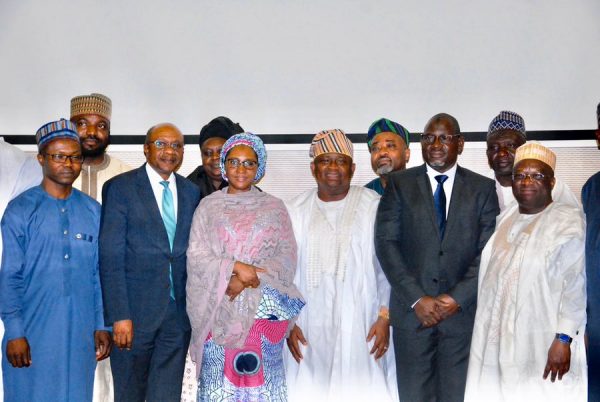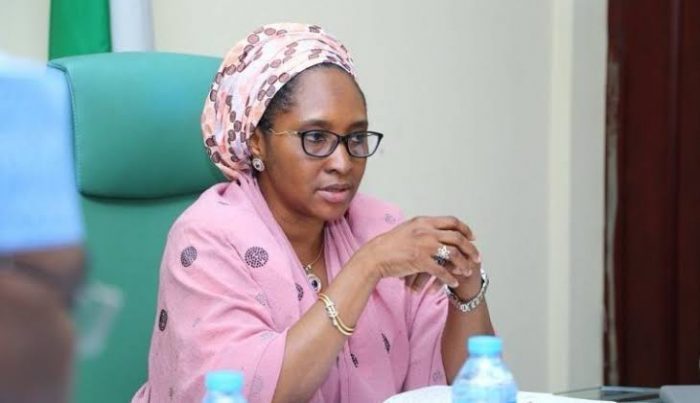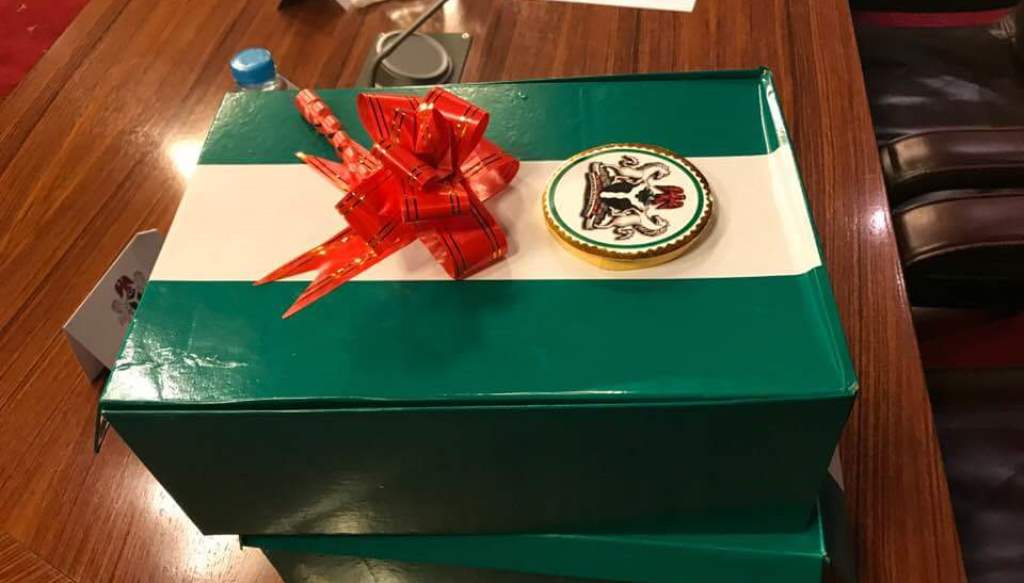…Dangote, 5 investors set to execute 19 road projects in 11 states
Following Federal Government’s resolve to continue with massive infrastructural development across the country under Executive Order #007 signed by President Muhammadu Buhari on Friday, the Minister of Finance, Mrs Zainab Shamsuna Ahmed, will chair the 13-man Scheme’s Management Committee of various road and bridge projects under the pilot phase.
This was contained in the statement signed by the Special Adviser to the Minister of Finance on Media and Communications, Paul Ella Abechi, where Ahmed explained that President Muhammadu Buhari, under the enabling legal framework, is empowered by Sections 5 and 315 of the 1999 Constitution to make Executive Orders, such as this Executive Order #007 of 2019, to alter, repeal or otherwise modify existing laws.
She further stated that one of her key priorities has been mobilising investments in developing human capital and physical infrastructure, in line with the Buhari-led administration’s Economic Recovery and Growth Plan (‘ERGP’), which she did not hesitate to challenge her team to “develop and deliver innovative ways of leveraging private finance through Public Private Partnerships, to address our infrastructure deficit.”
She also added that Executive Order #007 of 2019 on the Road Infrastructure Development and Refurbishment Investment Tax Credit Scheme was the outcome of her team’s efforts to think outside of the box and deploy new techniques to develop critical roads infrastructure across the country.
According to her the Scheme will incentivise private sector investment in Nigerian roads across key economic corridors and industrial clusters, relieving the Government of the burden of funding the initial outlays for these investments.
She said: “In terms of the enabling legal framework, Mr. President is empowered by Sections 5 and 315 of the 1999 Constitution to make Executive Orders, such as this Executive Order #007 of 2019, to alter, repeal or otherwise modify existing laws.
Furthermore, the relevant provisions of the Companies Income Tax Act empower “Mr. President to authorise the exemption from corporate taxation, for certain companies or groups of companies, by way of the issuance of tax credits. The Scheme is based on the demand for road projects by companies and other corporate sponsors, who are willing to deploy their own working capital and financial resources to fund road projects located in the major economic corridors of the country where they have significant businesses and operations.
“In terms of process and governance, prospective road projects are to be submitted to the Government via the Scheme’s Management Committee. This Management Committee, which I chair, has the Minister of Power, Works and Housing as its Deputy Chairman, and the Permanent Secretary of the Federal Ministry of Finance as its Secretary. The other members of the Management Committee are drawn from a number of relevant Federal Ministries, Departments and Agencies (‘MDAs’). They include: The Federal Ministry of Finance; The Federal Ministry of Power, Works and Housing; The Federal Ministry of Industry, Trade and Investment; The Federal Ministry of Justice.
“Others are The Bureau of Public Procurement; The Federal Inland Revenue Service; The Nigerian Investment Promotion Commission; The Securities and Exchange Commission; The Infrastructure Concession Regulatory Commission; The Budget Office of the Federation; The National Bureau of Statistics; The Nigeria Sovereign Investment Authority; and The Office of the Chief of Staff to the President
“After carefully considering submissions by Investors, the Management Committee will forward the proposals, through the Chairman of the Committee, to Mr. President, who is empowered, pursuant to the Executive Order, to select Eligible Road Projects.”
Meanwhile, the Minister disclosed that in the pilot phase of the scheme six private sector players in the construction industry will execute the Executive Order 7, which include Dangote Industries Limited; Lafarge Africa Plc; Unilever Nigeria Plc; Flour Mills of Nigeria Plc; Nigeria LNG Limited; and China Road and Bridge Corporation Nigeria Limited.
“These Investors will be investing in the following 19 Eligible Road Projects, totalling 794.4km which have been prioritised in 11 States across each of the 6 Geo-Political Zones: Construction of Ashaka-Bajoga Highway in Gombe State; Reconstruction of Dikwa-Gambaru Ngala Road in Borno State; Reconstruction of Bama-Banki Road in Borno State; Rehabilitation of Sharada Road in Kano State; Rehabilitation of Nnamdi Azikiwe Expressway / Bypass, in Kaduna State; Reconstruction of Birnin Gwari Expressway – Road in Kaduna State; Reconstruction of Birnin Gwari – Dansadau Road in Kaduna State; Reconstruction of Makurdi-Yandev-Gboko Road in Benue State; Reconstruction of Zone Roundabout-House of Assembly Road in Benue State.
“Others are Reconstruction of Obajana-Kabba Road in Kogi State; Reconstruction of Ekuku-Idoma-Obehira Road in Kogi State; Construction of Adavi Eba-Ikuehi-Obeiba-Obokore Road in Kogi State; Rehabilitation of Lokoja-Ganaja Road in Kogi State; Ofeme Community Road Network and Bridges in Abia State; Rehabilitation of Obele-Ilaro-Papalanto-Shagamu Road in Ogun State; Reconstruction of Sokoto Road in Ogun State; Reconstruction of Apapa-Oshodi-Oworonshoki-Ojota Road in Lagos State; Construction of Bodo-Bonny Road & Bridges across Opobo Channel in Rivers State; and Rehabilitation of Benin City – Asaba Road in Edo State.
“This list of Eligible Road Projects is not exhaustive. Indeed, we are actively soliciting for more serious proposals from interested Investors, State Governments and other stakeholders who may wish to take advantage of this Scheme to partner with the Federal Government in investing in roads. Our intention is for there to be at least one significant Eligible Road Project underway in every State of the Federation within the first year of the operation of this Scheme.”
According to her (Ahmed) once approved, these eligible road projects will be published in an Official Gazette, and modalities would be agreed upon with the investors to accelerate the implementation of these projects, the verification of eligible project costs, as well as the issuance of tax credit certificates to the Investors.
This Executive Order also provides mechanisms for groups of investors to pool funds together to invest in road projects – directly; jointly through special purpose vehicles; or indeed, in collaboration with institutional investors such as Pension Fund Administrators, Collective Investment Schemes, Insurance Companies and Investment Banks. These measures have been adopted to enhance the ease of accessibility to the Scheme’s benefits by prospective Investors.
“The Scheme’s implementation is to be supported by a rigorous monitoring and evaluation (‘M&E’) framework, which draws from the traditional capabilities of the Ministry of Power, Works and Housing, and Bureau of Public Procurement (‘BPP’), as well as the more innovative M&E framework which we have adopted in the implementation of our N2.5 trillion Presidential Infrastructure Development Fund, which is currently anchored by the Nigeria Sovereign Investment Authority (‘NSIA’).
“As is the case with all such tax expenditures, there is the need to ensure adequate safeguards to protect the National Treasury. In this regard, the Executive Order provides several prudential measures to enhance the integrity of the Scheme. These include the following: Investors may only be permitted to recover relevant project costs after these costs have been duly scrutinised by the Management Committee to ensure that only those costs that are wholly, reasonably, exclusively and necessarily incurred in the development and maintenance of the Eligible Roads are recouped.
“The quantum of tax credits that may be utilised by any participating Investor is restricted to ensure that in every tax year, the Investor must pay at least half of its normal corporate tax liability. However, unutilised tax credits may be deferred for use in subsequent fiscal years until the investments in the Eligible Road Projects are fully recouped.
“Investors shall not be entitled to claim any other tax credit, capital allowance, relief or incentive on relevant project costs incurred in respect of any Eligible Road Project under any law in force in Nigeria, in addition to the tax credits provided pursuant to this Scheme. This is to avoid a duplication of claims being made.
“ The Scheme upholds the powers of the Federal Inland Revenue Service, pursuant to Section 22 of the Companies Income Tax Act, to set aside any artificial or fictitious transactions that may be used to evade taxes, in accordance with extant anti-avoidance laws; and Fiscal Implication Reports will be regularly generated to monitor and track the fiscal costs of the Scheme in line with extant laws”, she said.


